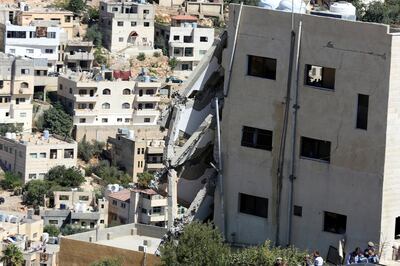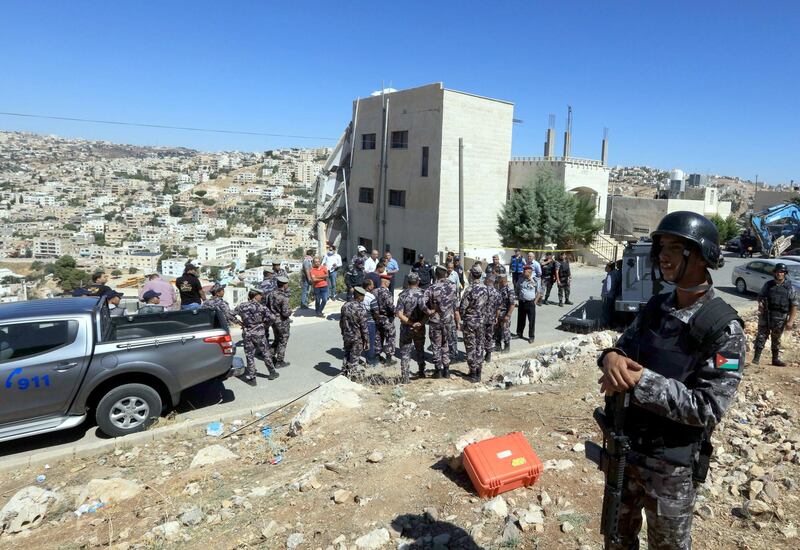Five militants are in custody after a shootout with Jordanian police that left four officers dead and dozens more wounded during a raid on an apartment block outside Amman on Saturday.
Jordanian government spokeswoman Jumana Ghunaimat said on Sunday that a fourth officer had died of wounds sustained during the operation in the town of Salt, some 20 kilometres west of Amman.
The manhunt was sparked by an explosion in the nearby Christian village of Fuheis on Friday that killed one officer of the Gendarmerie and wounded six other security personnel. The IED was placed on a spot where police vehicles often pause while patrolling a weeklong music festival that drew thousands of spectators.
As police searched for suspects, they zeroed in on the apartment complex in Salt. As police moved in to storm the building, they engaged in a gun battle with the militant cell holed up inside. The gunmen also detonated an explosive device, bringing down half the apartment block that is perched on the crest of a hill.
Some 20 security officers and civilians were injured in the operation. There has been no official confirmation of the condition of the wounded although reports indicate some are critical.
As well as the five suspects arrested in Saturday’s raid, during excavations of the rubble left when part of the apartment building collapsed after the bombing, police have recovered the bodies of three other suspected accomplices.
According to Ms Ghunaimat, automatic weapons were also found at the scene and investigations are ongoing.
She did not disclose details of the suspects, including nationalities, however local residents near the area claim that all five were Jordanian and had recently rented an apartment in the complex.
______________
Read more
Jordanians sceptical of corruption crackdown
The 'love pirates' of Petra: female tourists fall victim to romance scam in Jordan
Jordan warns of 'serious consequences' of revoking Palestinian refugee status
______________
The Hala Akhbar news website linked to Jordan's military said on Sunday that the suspects are Jordanians and that the cell planned to attack security installations and other sensitive targets.
Areas of the neighborhood around the building were still sealed by security cordons and there was a heavy police precence on the streets, local residents told The National. The government urged the public not to share details of the raids or infomation about the suspects on social media before investigations were wraped up. Jordanians have largelly oberved the media blackout with few users sharing names, locations or identifying details of the incident or the suspect on socal media or messaging apps.
As of Sunday afternoon, no group or individual had claimed responsibility for either Friday’s attack or Saturday’s violence.
King Abdullah II on Sunday denounced the "cowardly act of terrorism" and said Jordan would respond with "force and determination to eradicate terrorism and its criminal gangs."
Chairing a meeting of the National Policies Council at the Husseiniya Palace, King Abdullah expressed his condolences to the families of the officers killed, issuing a stern warning to armed groups that “cowardly” acts of violence would only unite Jordan and increase its resolve to “eradicate terrorism.”
The flag at the Royal Court flew half-mast on Sunday in honour of the “martyrs” killed in the weekend’s violence.
Jordanian officials began the demolition of the partially-collapsed apartment building, with the government warning residents to "stay away" from the area as security forces continued their sweep of the neighbourhood as they carried out the controlled demolition.
Ms Ghneimat said, "the building where the terrorist cell was captured was already empty and it will be destroyed."

Friday marked the first terrorist attack in Jordan since December 2016, when an ISIS sleeper cell seized the crusader castle in Karak, southern Jordan, using its vantage point on top of the hillside town to gun down police officers, killing 10 in a shootout with special forces.
Terrorist attacks in Jordan are rare, despite the country sharing a 375km border with Syria and a 175km border with Iraq near areas which at various times were under ISIS control.
Experts see parallels with this weekend’s violence and the 2016 ISIS attack: confronting security forces with heavy automatic weapons, preparing IEDs, targeting security officials rather than civilians.
“It is clear from the tactics that this is the work of a group that shares the ideology of ISIS,” says Hassan Abu Haniya, a Jordanian expert in Islamist and jihadist movements who has covered the movements’ evolution over the past two decades.
Experts believe that the group targets Jordan for its role as a support and a base for the coalition targeting the terrorist group in Iraq and Syria over the past three years.
“We are seeing a new phase of a decentralized ISIS, where individuals and small groups that share the ideology of ISIS are carrying revenge attacks in its name, perhaps with the coordination of ISIS members elsewhere,” Mr Abu Haniya added. “It is working as gangs, lone wolves and sleeper cells that are not directly connected to the central command which makes it a challenge for security agencies to crack down on them.
“This attack seems to be in-line with ISIS’s new strategy”, he said. “It could be a cell ideologically linked to ISIS but not directly connected to the organization… [but with] ISIL restructuring itself to adapt to a new stage that does not require it to seize territory… We are expecting to see more of such attacks across the region and beyond.”
Amer Sabaileh, a political analyst and director of Middle East Media and Political Studies Institute, a think tank with a branch in Amman, said the focus of attacks on security forces was particularly notable.
“The explosive device did not target civilians, although many people were attending the festival in Fuheis,” he said. “ISIS is sending a clear message that its enemies are the security forces. But this tactic does not prevent it from targeting civilians.”





